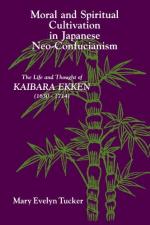|
This section contains 522 words (approx. 2 pages at 300 words per page) |

|
Kaibara Ekken, or Ekiken, a Japanese Confucianist influential in popularizing Confucian ethics among ordinary people, was born in Fukuoka. The son of a physician, he became a doctor himself, then left medicine to become a Zhu Xi neo-Confucianist. His teachers in Kyoto were Kinoshita Junan (1621–1698) and Yamazaki Ansai. At thirty-nine Kaibara returned to Fukuoka, where he spent the rest of his life in the service of the Kuroda fief. Blessed with an extraordinary capacity for work but little originality, he wrote on many subjects. He became an important botanist with the issuing of separate books on the vegetables, the flora, and the medicinal herbs of Japan. His books on education were pioneering works in pedagogy; Onna daigaku (The great learning for women), the standard book on women's ethics in the Tokugawa era, is attributed variously to him and to his well-educated wife. His books...
|
This section contains 522 words (approx. 2 pages at 300 words per page) |

|


